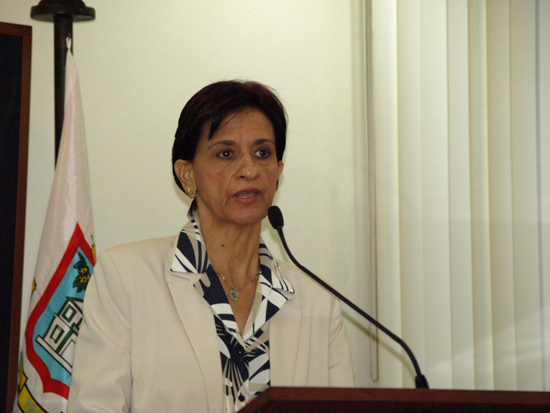 Philipsburg - Commissioner responsible for Education Affairs Sarah Wescot-Williams, says the Island Government is looking at a possible synchronization of policies where it relates to immigration, compulsory education and labour.
Philipsburg - Commissioner responsible for Education Affairs Sarah Wescot-Williams, says the Island Government is looking at a possible synchronization of policies where it relates to immigration, compulsory education and labour.A multi-disciplinary team comprising of the Education and Labour Departments, representatives of the Cabinet of the Governor, and St. Maarten's Judicial Affairs representative Richard Gibson Sr., met to discuss current developments and brainstorm about synchronization of policies where it concerns the Island and Central Governments.
"For example, there is a discrepancy in policies where it concerns the type of documents needed for a child to register at a school and this is confusing for parents as well as school administrators. A norm needs to be established on all levels where the registering of especially undocumented kids is concerned and where the parents don't have to fear immigration raids.
"You have a policy at the Central Government level where regardless of the child's status, the child should be allowed to attend school, however this does not mean that their parents will be granted a residence permit.
"The Island Government has decided to implement a phased process related to complying with compulsory education, whereby the Department of Education has started the process to register 4 to 6-year olds and have them placed in the school system for the 2009-2010 school year. Compulsory education will be implemented over a five-year period.
"There are a number of things that need to be synchronized. Policies at the Central Government level are conflicting with policies at the Island Territory level. There are changes taking place within the sphere of immigration and the Executive Council has not been consulted on these. The Central Government needs to be more forthcoming.
"Country St. Maarten cannot shy away from its responsibilities and will deal with the challenges that will be left behind when the dismantling of the Netherlands Antilles has concluded," Commissioner of Educational Affairs Sarah Wescot-Williams told the Government Information Service (GIS).
Another project that the Island Government is currently seeking funding from USONA for is a study of the status of undocumented schools with respect to teachers' competencies, qualifications, physical infrastructure of buildings, and the learning abilities and disabilities of the children attending those schools as well as the training of truant officers.
It became clear in the meeting that the program needs to be implemented to clear up the backlog of persons whose status remains undocumented or in process and who have been residing on the island before December 31, 2005.
The next question of course would be according to Commissioner Wescot is, what about those persons who came in after December 31, 2005?
Everybody agreed that border controls needed to be enhanced in order to stop the future influx of persons who continue to put tremendous pressure on public and social services.












